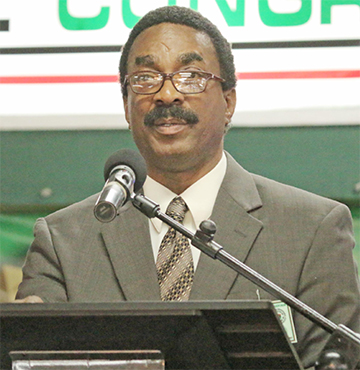Charging that Attorney General (AG) Basil Williams SC has deliberately avoided being served a copy of the order made by Chief Justice (ag) Roxane George in relation to the operationalisation of the Judicial Review Act (JRA), his predecessor Anil Nandlall said yesterday that contempt proceedings against the AG will be filed today.
“It is clear that the Attorney General believes that he is above the law so he is avoiding personal service. However, the law is not an ass. The arms of the law are very long. I have outlined sufficient evidence which will establish to any Court that the Attorney General is aware of the Order of Justice George and that he is avoiding personal service of the same”, Nandlall said in a statement.
This issue has attracted much attention ever since Williams lost his bid to hold off the operationalisation of the legislation which was passed by Parliament in 2010. The Court of Appeal last Thursday dismissed the AG’s application for a stay of execution of Justice George’s order which was made in May and pointed out that he (Williams) appeared determined to obstruct persons from accessing a greater range of public law remedies.

It is unclear whether Cabinet has instructed Williams to seek to delay the implementation of the JRA or he is acting of his own accord.
Justice George had issued an order compelling Williams to bring the law into force by July 31st. Following the Court of Appeal’s rebuff, the Ministry of Legal Affairs last Saturday declared that the JRA will not be operationalised until consultations are held and amendments are made.
In his statement yesterday, Nandlall highlighted what is legally required to bring contempt proceedings as well as all the efforts he has made to follow these requirements.
The law of contempt, he said requires the Order of Court which is being enforced by contempt proceedings to be served personally on the contemnor. Alternatively, the law requires evidence to be produced to establish to the satisfaction of the Court that the contemnor is avoiding service but knows of the Order of Court, he said.
“All attempts to serve a copy of Chief Justice George’s Order upon Attorney General Basil Williams, compelling him to bring the Judicial Review Act into force by the 31st of July, 2018, have thus far proven futile”, Nandlall said before noting that earlier in the day a Marshall of the High Court attempted to serve Williams a copy of the Order at his Carmichael Street office but was informed by his Personal Assistant that the AG ”cannot be served personally, by a Marshall with an Order of Court”.
He said that the previous day (Tuesday) a copy of the said order was served by a Marshall on the Personal Assistant of the AG at the AG’s Chambers and on Monday, a copy of the said order was served on a clerk at the said chambers.
According to Nandlall, the Solicitor General and two other lawyers from the AG’s office were present in court when Justice George made her order.
He said that given his efforts, he has “accumulated enough evidence in relation to service and the contempt of court proceedings will be filed (today)”.
According to Nandlall, the AG is the principal legal advisor to the government and is also `ex officio’, supposedly, the Head of the Guyana Bar. “It is unfortunate that a person holding such Offices is demonstrating such gross disrespect for the judiciary and the rule of law, generally”, he said before making reference to the issue Williams had with Justice Franklin Holder.
Disrespect
“This Administration, from the President to its most Junior Ministers, have repeatedly and callously demonstrated crass disrespect for the laws of this country, our Judges and the legal process and of course the Constitution. It is up to the Judiciary to now play its part”, he stressed.
In her ruling, Justice George found that Williams had a duty to have already brought the legislation, which is intended to work in tandem with the Civil Procedure Rules (CPR), into effect.
Among other things, the Chief Justice noted that with the CPR enforced, it was thereafter for the Minister of Legal Affairs to have also brought the JRA into operation, irrespective of which government is in power.
Justice George declared that Williams would have breached his duty by not bringing the Act into force, while noting that no excuse had been given and the delay on his part could only have been seen as a refusal to operationalise the law.
Appellate Justice Rafiq Khan, in delivering his decision, was very critical of Williams’ behaviour, particularly his disregard in carrying out his mandate in keeping with the Act.
He explained that the JRA became part of the laws of Guyana when the then president assented to it on 2nd November, 2010. “Parliament saw it fit to delay the coming into operation of the JRA by vesting in the minister the power to bring it into force by order,” he said, while adding that Parliament intended that it should be operational so as to make available to the public a number of remedies for judicial review.
He said that the “only credible and sensible explanation” of the failure to have the JRA immediately brought into existence was that advanced by Williams, that is, that “the CPR which supplied the procedure and practice for the operation of the JRA was not at the time in a state of readiness.” He, however, pointed out that at the present time this is no longer the case.
The judge said that in his opinion, what exists in this case is the “frustration and obstruction of the legislative arm of the government” in carrying out its constitutional mandate of making laws for the peace, order and good government of Guyana, “by a member of the executive who reflexively seeks refuge in a rigid and anachronistic interpretation of the doctrine of separation of powers long discarded by modern constitutional law thinking and concepts of good governance and democracy.” He said that it is also apparent that the executive “seems to be obstructing itself.”
He also said that Williams’ resistance to bringing the act into operation is “not a satisfactory state of affairs.” Section (1) of the Act, he said makes it clear that Williams is duty-bound to make it operational.
“I must admit I found some difficulty as I attempted to rationalise the submissions on behalf of the applicant that the appeal would be rendered nugatory were I not to grant a stay of execution,” Khan said.
The appellate judge maintained that the arguments brought by Williams had no reasonable prospect of success and as such the application could not be granted.
He said that the solution would either be to reverse the commencement or repeal the Act. “I cannot see how giving the public a greater range of public law remedies and a modern system by which they may be obtained is such a bad thing. Having to amend the Act after its implementation would not render an appeal nugatory. Amendments to existing pieces of legislation are part of the normal business of the legislature. I do not see how having to amend the JRA subsequent to its implementation would render the appeal nugatory,” he noted.
Existing lacunas
In its press release, the Ministry of Legal Affairs said in part that it intends to follow best practices and consult with stakeholders before the implementation of the Act. The release which was issued two days after the appellate court’s decision stated that “these consultations will ensure that improvements and amendments be made to cure existing lacunas in the current Judicial Review Act and to bring it in line with established regional and international best practices such as those highlighted by the CCJ … in the recent case of The Medical Council of Guyana-v-Jose Ocampo Trueba.”
Following the tabling of the legislation by the then AG Charles Ramson, the House was unanimous on its importance and this led to its passage.
Prominent attorney Christopher Ram, in a letter published in yesterday’s edition of the Stabroek News described Williams’ attitude to the Act as hypocritical, opportunistic, anti-democratic and dangerous.
He said that Ramson, Nandlall, Clarissa Riehl of the PNCR and then AFC Member of Parliament Khemraj Ramjattan had all spoken positively about the Judicial Review Bill prior to its passage.
“…let us not forget, even if he himself has, that then shadow Attorney General and now Attorney General Basil Williams also congratulated Mr. Ramson for bringing the Bill to the National Assembly”, Ram said.
Ram accused Williams of “playing games with people’s rights, the authority of the courts and the rule of law” and said that the “legal profession, civil society and the citizenry have no option but to show their abhorrence of this vulgar, crude and anti-democratic attempt to roll back citizens’ rights by no less a person than the Attorney General and the chief legal advisor to the Government”.
He warned that there should be absolutely no delay in bringing contempt proceedings against Williams and expressed hope that such a move would be led by the Guyana Bar Association.










